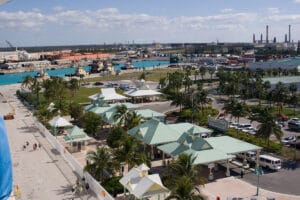The United Kingdom promises thousands of additional employees in the Freeports proposal.

To spur economic growth, the UK plans to unveil five new freeports and a new investment zone in the Budget next week.
According to Prime Minister Sir Keir Starmer, it is a component of a strategy to boost trade and assist generate thousands of jobs in the UK. Although Sir Keir admitted that the Conservatives had instituted the freeport policy, he stated that “better structures and more local authority involvement” are two things that need to be improved.
Describe freeports.

Areas close to airports or shipping ports known as “freeports” exempt imported products from tariffs, which are levies typically paid to the UK government.
Companies in these regions also pay less in property taxes and national insurance, another tax on new hires.
According to the theory, they increase economic activity such as investment, commerce, and job creation.
Only completed goods that are shipped to other parts of the UK are subject to tariffs paid by manufacturers in freeports. Ports in Inverness, the Forth, Teesside, the Humber, Liverpool, Anglesey, Milford Haven, Plymouth, the Solent, the Thames, Felixstowe, and Harwich are among their locations.
The Office for Budgetary Responsibility, which oversees the government’s budget, estimated in 2021 that tax breaks in England’s freeports will cost the UK government £50 million a year.
According to the statement, historical data indicates that their “main effect” would be to shift economic activity from one location to another.
According to the Scottish Greens’ 2023 argument, freeports have also been connected to low wages, smuggling, money laundering, and organized crime on a global scale.
However, the government claims that freeports have generated an estimated 6,000 jobs and £2.9 billion in investment in the UK.
Raising employers’ national insurance will generate £20 billion.

In order to enhance financing for public services, notably the NHS, the chancellor plans to raise the National Insurance rate for employers.
In addition, Rachel Reeves is anticipated to reduce the tax threshold for employers in Wednesday’s budget, which will raise almost £20 billion. Employers already pay 13.8% National Insurance on wages over £175 per week. Prime Minister Sir Keir Starmer declined to comment on the specifics of Wednesday’s budget during a press briefing at the Commonwealth Heads of Government Meeting in Samoa.
The second-largest source of income for the UK after income tax is national insurance contributions. Employers pay it on top of the wages they give out, and employees and independent contractors pay it from their earnings and profits.
With the chancellor arguing that there is a £22 billion “hole” in the public finances, speculation that Labour may propose tax increases in its first budget in over 15 years has been intensifying.
In addition to National Insurance for employers, income tax thresholds might be frozen, which would mean that when salaries increase and surpass the fixed criteria, more people would be “dragged” into paying greater rates of tax.
Digital payroll systems allow for the speedy introduction of tax adjustments within weeks of a budget, which also allows for the rapid generation of money.
For instance, according to public Treasury figures, raising the employer rate by two percentage points to 15.8% would result in an annual increase of almost £18 billion.
Such a sum would likely be greater, though, as Reeves is also anticipated to alter the threshold at which businesses begin to pay the charge.
India has a lot to teach us, a UK minister argues.
London: According to a Cabinet minister in Prime Minister Keir Starmer’s administration, the UK can learn a lot from India, especially in the areas of artificial intelligence (AI) and space research. Speaking at a Diwali celebration hosted by the Labour Indian diaspora organization on Monday night, UK Secretary of State for Work and Pensions Liz Kendall reaffirmed the party’s commitment to pursuing a free trade agreement (FTA) and greater links with India in its July general election manifesto. The minister stated that she is still committed to promoting the India-UK relationship within the Labour government and in her city as a member of Parliament from Leicester West, a constituency that is strongly linked to the British-Indian population.
The minister cited David Lammy’s post-election trip to India, where he established a new bilateral tech security relationship just weeks after becoming the UK’s Foreign Secretary.
You, British Indians, will contribute to not only rekindling but also igniting the flame that has burned brightly in the most proud moments of our history that politics can be a force for good as we rebuild society’s trust in politics and politicians this Diwali. “Darkness can be defeated by light,” he declared.
